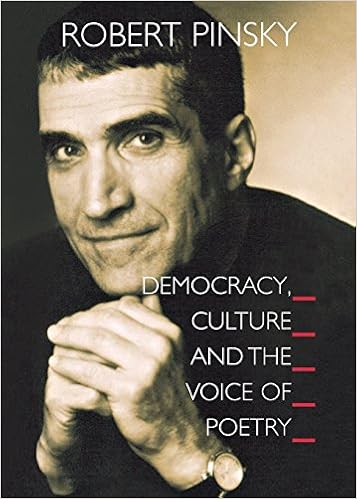 Robert Pinsky tackles Democracy, Culture and the Voice of Poetry, which seems a rather daunting task, especially for the book's modest size. A subtitle might ask what poetry's current role is in America. During his tenure as U.S. Poet Laureate, one of his self-appointed tasks was to get average Americans to comment on favorite poems. An immigrant from Laos, Pov Chin, here comments on how much Langston Hughes's "Minstrel Man" means to her. A critic apparently took the approach to task, saying it illustrated American narcissism. Pinsky, on the other hand, seems to admire the poem's strength through its adaptability, to fit someone's circumstances in a wholly different cultural context. I tend to lean in Pinsky's favor.
Robert Pinsky tackles Democracy, Culture and the Voice of Poetry, which seems a rather daunting task, especially for the book's modest size. A subtitle might ask what poetry's current role is in America. During his tenure as U.S. Poet Laureate, one of his self-appointed tasks was to get average Americans to comment on favorite poems. An immigrant from Laos, Pov Chin, here comments on how much Langston Hughes's "Minstrel Man" means to her. A critic apparently took the approach to task, saying it illustrated American narcissism. Pinsky, on the other hand, seems to admire the poem's strength through its adaptability, to fit someone's circumstances in a wholly different cultural context. I tend to lean in Pinsky's favor.Pinsky opens the brief book by distinguishing wrong-headed impetuses that can damage a democracy: 1) colon, that is the tendency to all the same within a culture, and 2) cult, the tendency to divide and fragment a culture. In opening with this, he lends special weight to the idea but never comes back to it--at least not explicitly. Maybe he means to suggest that these are twin ditches ("keeping it between the ditches") or Scylla and Charybdis that the wary poet has to sail his ship between. In referring to the above critic, maybe Pinsky means to suggest the critic fell prey to one ditch or the other.
Pinsky quotes Alexis DeTocqueville (from Chapter XVII OF "SOME SOURCES OF POETRY AMONG DEMOCRATIC NATIONS" of DEMOCRACY IN AMERICA) as saying
"I am persuaded that in the end democracy diverts the imagination from all that is external to man [such as Nature] and fixes it on man alone."Pinsky makes no direct connections, but maybe he means to suggest a specific meaning to this. He refers to a handful of poems without ever explicitly what his point in analysis is. These are "Home Burial" by Robert Frost, T. S. Eliot's "The Love Song of J. Alfred Prufrock", Elizabeth Bishop's "In the Waiting Room", and Edward Arlington Robinson's "Eros Turannos". This last Pinsky contrasts with the Carl Sandberg's Chicago poems which appeared that same issue and won poetry's then biggest award*. Sandberg's is probably more ostentatiously American--broad, sweeping, encompassing--but Pinsky calls on the voice of an anonymous American wife for whom the Robinson poem took on special meaning because her husband was away on business all the time and got hooked on drugs and alcohol.
It may be that Pinsky agrees and disagrees with his critic. Yes, people do take in poems and make it their own--not for narcissistic reasons but personal ones. That a poem can be absorbed by average human beings must be part of the appeal of doing a project that has "Americans [say] poems they love." Truly, that must be the democratic appeal of such an unofficial survey.
* Pinsky doesn't quite dismiss the Sandberg poems, but he does suggest that Robinson's poem is superior from this vantage in the future. His argument mirrors David Orr's in favor of Bishop over the ambitious Robert Lowell. This seems to represent a shift in predominant thought about poetry in the twentieth century. In Sandberg's poems, the voices of Walt Whitman and Allen Ginsberg echo although in general I am probably in agreement with Pinsky and Orr.

No comments:
Post a Comment